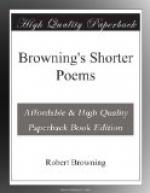AN EPISTLE. (PAGE 183.)
The Arabs were among the earliest in the cultivation of mathematical and medical science. This fact, together with their monotheism, makes Karshish an appropriate character for the experience of the poem.
1-14. An ancient and oriental idea of the soul and its relation to the body.
15. =Sage=. Abib, to whom the letter is sent.
17. =snake-stone=. A stone used to cure snake-bites.
19. =charms=. Note here and elsewhere the mixture of science and superstition.
21-33. The poet has given local color to the journey.
28. =Vespasian= was appointed general-in-chief against the insurgent Jews in 67 A.D., and began the great siege of Jerusalem in 70 A.D. The date of the poem and the length of time since Lazarus’s return to life may thus be estimated.
37-38. Note the vividness gained by making Karshish keep the physician’s point of view.
44. =falling-sickness ... cure=. Epilepsy. Karshish is already admitting into his letter the story of Lazarus.
48. Not only spiders, but many other animals or parts of animals were formerly used as medicines.
64-65. Karshish, still half ashamed of his interest in the marvellous story he has to tell, first gives this as a pretext, and then, in the next lines confesses.
171 ff. Belief in magic survived in some degree among the educated until a century or two ago.
177. =Greek-fire=. A violently inflammable substance, supposed to have been a compound of naphtha, sulphur, and nitre, which was hurled against the enemy in battle. As it was first used in 673, in the siege of Constantinople, Browning is guilty of an unimportant anachronism.
252-255. A good touch, to make the earthquake mean to Karshish an omen of the gravest event within his ken.
268-269. Karshish, still unconvinced by the story of Lazarus, naturally regards it as irreverent.
304-311. This comes to Karshish as an afterthought, a corollary to the idea in the body of the poem.
How is the general style of the verse-letter maintained? What is Karshish’s mission in Judea? How does he show his devotion to his art? Point out instances of local color. Are they in harmony with the main current of the poem, or do they detract from the interest in the story? Why does Karshish work up to his story so diffidently? Why has the incident taken such hold upon him? What do you conceive to be his character and worth as a man?
What of Lazarus? What change has been wrought in him? Is he in any way unfitted for this life? To what does Karshish compare him, with his sudden wealth of insight behind the veil of the next world? Which of the two men is better fitted for the condition in which he is placed? What religious significance does the story of Lazarus come to have to Karshish? What parallel ideas do you find in Rabbi Ben Ezra and in this poem? Compare George Eliot’s story, The Lifted Veil.




